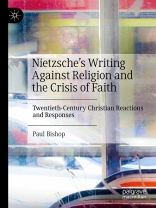This book offers an exercise in reception theory and investigates the key figures in the reception of Nietzsche’s critique of Judeo-Christianity in the course of the twentieth century. It has often been remarked upon — but rarely, if ever, explained — why Nietzsche, the author of the famous parable in The Gay Science in which a madman announces the “death of God” and a self-proclaimed opponent of organised religion, should have been a figure of such profound interest to writers, thinkers and theologians who were of a Christian persuasion. In order better to understand the attractiveness of Nietzsche to practitioners of faith, this book undertakes an analytical study of the reception of Nietzsche by around a dozen writers and thinkers working within the discourse of twentieth-century theology in the European tradition (French, Italian, German, Polish, and Swiss).
Spis treści
Chapter 1: Introduction.- Chapter 2: Politics, Ethics, and Philosophical Anthropology: Charles Maurras and Giovanni Papini, Nicolai Hartmann and Max Scheler.- Chapter 3: From The Drama of Atheism to the Apocalypse of the German Soul: Henri de Lubac, Gabriel Marcel, Emmanuel Mounier, Hans Urs von Balthasar.- Chapter 4: Analogia entis and Nietzschean Mysticism: The Work of Erich Pryzwara.- Chapter 5: From God in Exile to I See Satan Fall Like Lightning: Cornelio Fabro, Romano Guardini, and René Girard.- Chapter 6: “An untimely figure who still speaks to us?” Paul Valadier, Georges Morel, Bertrand Vergely, and the Search for the Sacred.
O autorze
Paul Bishop is William Jacks Professor of Modern Languages at the University of Glasgow. He has published widely on Nietzsche and related figures, including German Political Thought and the Discourse of Platonism: Finding the Way out of the Cave (Palgrave Macmillan, 2019).












